|
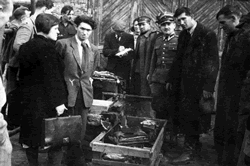
October 1946
Discovery of one of the hiding places of the archival materials of the
Lodz Ghetto Archive at #13 Lutomierska Street, the former site of the
fire department of the ghetto
The Lodz Ghetto Archive was established on November 17, 1940, by order
of the Chairman of the Judenrat, Mordechai Chaim Rumkowski. Originally
tasked with preserving archival material of the Jewish community from
before the war and of the communal institutions established in the
ghetto, the archives eventually began to collect information on the
history of the Lodz Ghetto. Their guiding principle in this task, as
stated by their director Henryk Naftalin, was “creating a basis for
future scholars to study Jewish society in one of its most trying
periods.” In addition to conducting interviews, collecting materials,
and producing historical monographs, the archives produced the
Chronicle of the Lodz Ghetto, regularly documenting for over three
years the events and life of the ghetto. Along with the other
materials of the archives, the parts of the Chronicle were hidden in
different locations before the liquidation of the ghetto in 1944.
Lodz resident Nachman Zonabend, who managed to escape from the ghetto
and remained in the city until liberation in January 1945, took one
large section of the archives, including the Chronicle, out of the
ghetto. The second set of archival materials was discovered in October
1946 at #13 Lutomierska Street, at the former site of the ghetto fire
department. A third cache of archival materials was hidden in the
Jewish cemetery, but was subsequently discovered by the Germans and
destroyed. Yad Vashem |
|
I am looking for my grandparents' real estate and properties in the
old city of Lodz. their names were Israel and Riwka Gershonowitz his
wife maiden name was Widowsky they died in 1941 and are buried in the
Lodz cemetery. my name is Jehuda Tyberg i would like to know if you
can find the records.
thank you
Rjidl@aol.com |
|
From: <susan@delden....
I am looking for the family of Bela GOLDMAN nee PARZENCZEWSKA born in Lodz
in 1913 and her daughter Miriam/Mirka born in Lodz in 1935. They were
deported from the Lodz Ghetto to Auschwitz but are believed to have survived
and come to Israel/Palestine before February 1946. If anyone knows this
family please contact me privately.
Many thanks,
Susan EDEL, Petach Tikva, Israel |
|
Szanowni:
Wasz Web: http://www.eilatgordinlevitan.com/krakow/krakow.html
Jeest znakomity. Urodzilem sie w Lodzi. Lata szkolene, mlodosc,
przyjaciele. Potem Warszawa, studia. W pewnym momencie zdecydowalem
sie na wyjazd. Poczatek lat 70-tych.
Od wieli lat w Vancouver VC, Kanada
e-mail: capilano1944@shaw.ca
Od pewnego czasu powracam do lat mlodosci. Bylem w Polsce kilka razy.
Zdecydowalem sie takze prowadzic blog jako /nick/ Eternity w
salonie24. Pisze tam rozne notaki.
Ostatnio napisalem:
Mamusiu, czy bede nas wieszac?
http://eternity.salon24.pl/
Chcialbym sie zapytac, czy moge korzystac z Waszych zdjec
pamiatkowych. Oczywiscie podajac zrodlo i autora.
Pozdrawiam
Igor Adams
Vancouver BC Canada
Dane osobowe do dyskrecji. |
|
mechapsim@yahoo.com> wrote:
Shalom,
I found a picture of Walter Ziser on your Lodz site. Ziser was the married
name of my grandmother’s sister and we can see a family resemblance. If you
have any more information about Walter Ziser or the Ziser family I would
like to hear from you. I read Hebrew (also French and Spanish), so language
should not be a problem.
Am Yisrael Chai,
Raymond
Dear Raymond,
On the Yad vashem site I found reports for Zisers from Lodz. Here is what I have about Walter;
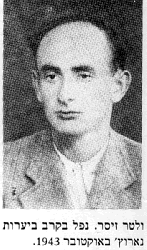
Walter Ziser or Suser was a student of Krakow University before the war. He was a member of a Zionist Youth movement. In 1939 when the Nazis invaded Poland he escaped to Vilna which was under Soviet control. In 1941 Vilna/ Vilnius was attacked and the Nazis took over. Walter was in the Vilna ghetto and joined the underground. He was able to escape the ghetto and join the resistance in the Naarutz forsets (today in Belarus, not far from the border with Lithuania. He was killed while fighting the Nazis in 1934. His friends who survived wrote about him in a book what a hero and a nice guy he was.
.................................................................
From Yad Vashem
Walter Suesser was born in Ziwiec, Poland in 1918 to Berta. He was a student and single. Prior to WWII he lived in Ziwiec, Poland. During the war he was in Wilna. Walter was murdered/perished in the Shoah. This information is based on a Page of Testimony (displayed on left) submitted by his cousin Benjamin Richtman of Kiryat Motzkin, Israel. .
Robert Suesser was born in Zywiec, Poland in 1920 to Berta. He was a pupil and single. Prior to WWII he lived in Zywiec, Poland. During the war he was in Krakow, Poland. Robert was murdered/perished in the Shoah. This information is based on a Page of Testimony submitted by his cousin Benjamin Richtman of Kiryat Motzkin, Israel.
Robert Suesser was born in Zywiec, Poland. Prior to WWII he lived in Zywiec, Poland. Robert was murdered/perished in the Shoah at the age of 20. This information is based on a Page of Testimony
On Tue, Mar 5, 2013 at 8:23 PM, Raymond Lennark <mechapsim@yahoo.com> wrote: 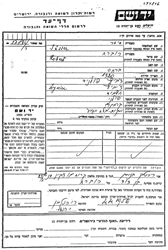 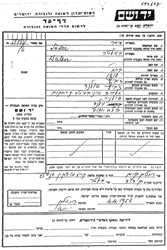
|
|
LitvakSIG is pleased to announce that a majority of the known, microfilmed
vital records available for towns in the Vilnius Gubernia have now been or
are in the process of being translated.
The Vilnius Gubernia VRT Project has now been incorporated into the relevant
District Research Groups for towns in Lida, Oshmiany, Trakai and Vilnius
Districts. The groups are responsible for funding translations of remaining
available vital records. The files will be available on the district
Shutterfly websites.
The spreadsheet files for the towns in Lida, Oshmiany and Trakai districts
have been posted to their Shutterfly sites. The files for the towns in
Vilnius District will be posted to that Shutterfly site over the next few
months. Future translations of remaining filmed vital records will be funded
by the Vilnius District Research Group.
Many but not all, of the vital records are already in the ALD. The rest will
become available in the ALD over the next several years; in no case less
than 18 months from date of receipt of translations.
No vital records for towns in Disna or Svencionys districts were
microfilmed, nor included in the original VRT Project.
Those who contributed the qualifying amount to a vital records project for
a town in Vilnius District will receive the spreadsheets received to date.
Effective with this announcement a qualifying contribution of $100 to the
Vilnius District Research Group will be necessary for access future filmed
vital records translations. This contribution will provide you with early
access to all records translated by the district group thus far (revision,
family, tax, voter and other gubernia wide lists).
A $100 contribution to any research group allows for early access to data
for a 5 year period, based on calendar years, not contribution date.
Contributions made after Yom Kippur are considered to be made in the
following calendar year. Contribute now and you maintain early access
through December 31, 2017. (This is true for all research groups).
The LitvakSIG Vital Records Translation Project (VRT) was a huge project
which proved of immense interest to our researchers, as evidenced by the
financial support the project elicited. Since its launching in the year
2000, close to $250,000 was contributed by you and your fellow researchers
specifically earmarked for translations of vital records. Your membership
dues, other unrestricted contributions and corporate (employer) matching
funds of almost $50,000 have also been used for the translation of vital
records in all gubernii.
Sincere thanks to everyone involved in making this announcement possible:
the volunteers who coordinated fundraising and translations, those with
language skills who gave their time to do translations, and especially the
contributors whose support enabled this huge success.
As later years of records become available to us for translation, we hope we
can rely on you for your continuing financial support. Rabbinate vital
records which were not microfilmed are often for 20th century years, are
being translated for some towns and we intend to continue those translations
where funding is available. Your contributions to District Research Groups
noting Town Name-Rabbinate VRT are appreciated.
This is truly a collective effort and we all share and take great pride in
this achievement.
We hope you find your ancestors in these records but please understand that
many years' records are missing, have been lost, or have been destroyed due
to fire or war.
For those reasons, it is important you continue to support the work of the
Research Groups who continue to translate other types of lists, which will
often be the only source for you to locate your ancestors.
Special thanks to Joel Ratner, the original Coordinator of the entire VRT
Project and more recently coordinator of the Vilnius Gubernia, then the
Vilnius District VRT projects. Likewise, we thank Aaron Roetenberg who was
the Kaunas Gubernia VRT Coordinator and who continues to be involved. We
also have to thank Howard Margol and Dorothy Leivers. Howard was involved
with the VRT Project from its beginning and is now Records Acquisition and
Translation Coordinator for LitvakSIG. Dorothy does double duty as Suwalki
Gubernia Coordinator and over-all Coordinator of all District Research
Groups.
If you would like to support translations of any vital records, please make
your contribution to the relevant Research Group, and enter the name of the
town - VRT in the Notes Box of the online form at
www.litvaksig.org/contribute. A $100 contribution qualifies you for early
access to data for your Research Group, including the vital records within
that group.
Mazel Tov to everyone and sincere thanks for your interest, involvement and
support.
Eden Joachim
President
The database and discussion group of LitvakSIG
(litvaksig@lyris.jewishgen.org) are hosted by JewishGen |
|
About 2 years ago, I received an email from Researcher 476201,
Robert Seidel, asking me if I thought that his Gasse relative might
be the same or a connection to my Gasse relative. He wrote: "She
had family in Lodz. Her name was Syma Gasse (or Hasse) Braun, and
she lived in Osiek Poland before the War. She was my great
grandmother."
Syma Gasse/Hasse Braun is also my great-grandmother, which would
make Mr. Seidel and me second cousins. If he is reading this,
would he please contact me. Or if anyone knows him, please ask him
to get in touch with me.
Thank you.
sharon brown (Researcher 170543)
swansea636@
RESEARCHING: BRAUM, BRAUN, BROWN / GASSEE, HASSE / WACHSMAN /
BLACKSTEIN, BLACKSTONE, BLACHSZTAJN / APPELBAUM / TAJTELBAUM /
FLYASHMAN / GOLDWASER / MINTZ / KNEBEL / RAICHMAN, RICHMAN, LERMAN /
SMITH / VILLIERS / MILLER / WEISMAN / FREEMAN / BARNOY (Places:
Osiek, Staszow, Klimontow, Ostrowiec, Cmielow, Bogoria, Polaniec
(Poland). Utica, New York, Portland, ME., Boston, New York, Toronto
|
|
David Frischmann
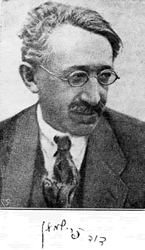
Russian Hebraist; born in Lodz 1863; now (1903) residing in Warsaw. Frischman began very early to write both poetry and prose in Hebrew periodicals, and his style and the originality of his views soon attracted attention. He was assistant editor of "Ha-Yom," in St. Petersburg (1886-87), and afterward editor of the weekly "Ha-Dor." Frischman has contributed a large number of poems, short stories, and articles to the Hebrew periodicals during the last twenty years. His earlier writings are to be found in "Ha-Bo?er Or," "Ha-Sha?ar," "Ha-Asif," etc. His works include: the short story "Be-Yom ha-Kippurim," Warsaw, 1881; his successful translation of Aaron Bernstein's "Aus dem Reiche der Natur," under the title "Yedi'ot ha-?eva'" (The Perceptions of Nature) (1882-85); "Tohu wo-Bohu," a scathing criticism of Hebrew journalistic methods, especially directed against "Ha-Meli?," with an appendix, "'Al ha-Nes," in which I. L. Lewin's translation of Disraeli's "Tancred" is severely criticized (ib. 1883); "Miktavim 'al Devar ha-Sifrut" (Notes on the History of Literature), a criticism against contemporary Hebrew literature (Warsaw, 1895). He also translated Julius Lippert's "Kulturgeschichte," under the title "Toledot Hashlamat ha-Adam," in three parts (ib. 1894-1901). A collection of his scattered articles and feuilletons is at present (1903) being published in Warsaw under the title "Ketavim Niv?arim." Frischman has also written considerably for Yiddish periodicals. The poem "Ophir" in the "Yidcirclehe Volksbibliothek" deserves to be mentioned. He has done much to introduce Western methods into Neo-Hebrew literature.
Source: http://www.jewishencyclopedia.com
|
|
sulla4@yahoo.com
http://www.eilatgordinlevitan.com/index_pix_etc/jews_of_russian_empire_denied_permission_to_go_abroad_1916_1917.htm The link includes information about my great grandfather GRINBARG-SULLA. He and all the family perished in Lodz ghetto and we scamble to find information about them. Do you know what this list is about? How it was compiled and how GRINBARG-SULLA was included. Where could we find the origin?
Thank you,
Victor Sulla sulla4@yahoo.com
Dear Victor,
The list is from the first world war for people who attempted to leave the Russian empire but were refused; Last name GRINBARG-SULLA first name Boruch son of Aizik age 34 a refugee from Lodz; belonged to Uman JC, Kiev gub. community on March 31st 1916 from Lodz List of people who could not move abroad
|
|
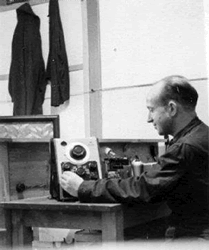
1. Assumed to be a picture of Szaja Weksler (1914-1942) listening to the radio.
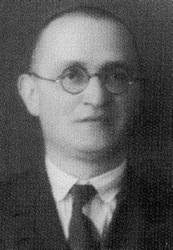
2. Jankiel Weksler
(1890-1944)
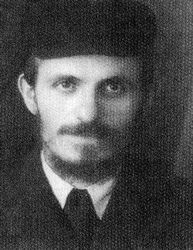
3. Hanoch Weksler
(1896-1944)
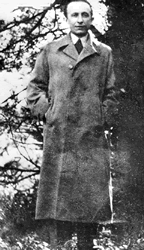
4. Chaim Natan Widawski
(1908-1944)
This post is dedicated to the memory of my great-grandfather Yakov (Jankiel) Wexler, his nephew and their cell members who were executed by the Germans 73 years ago today (7.6), or who lost their lives around this date and under related circumstances.
The radio underground of the Lodz ghetto is an example for Jews from different political backgrounds that worked in unison for a common goal against the calamity of the times of the Holocaust, while risking and even sacrificing their lives.
Right at the beginning of the German occupation of Poland, in which the city of ?ód? was forcibly incorporated into the German Reich and re-named as "Litzmannstadt", Poles and Jews were forbidden to keep radio receivers and listen to them. The punishment for the offense was death. In the middle of 1941, a homemade radio was installed in the Lodz ghetto, at the home of Icchak Lubinski. The radio receiver was built by Wiktor Rundbaken, a radio technician by his profession. Among the listeners to the radio were: Dawid Tapel, a man who was in command of several languages and could translate news; Hanoch Weksler, a Gur Hasid; His son, Jeszajahu- Kalman (Szaja) , a member of the Bejtar movement, an officer in the Polish army ; Jankiel Weksler, a member of the Bund, his sons Szymon (Szymek), a member of the Polish Socialist Party (PPS) and Kalman-Karol Weksler; as well as others, not necessarily as frequently. The listeners spread in the Ghetto information that they have been exposed to them while listening to the radio.
According to testimony given by the son of the ghetto resident, Menachem (Menek) Heitler (later Har-Tal): "... It [the radio] was listened to in order to keep abreast of the situation on the front and the progress of the Red Army. They knew that as soon as the Red Army approached, the Germans would liquidate the ghetto and will flee westward. When they heard the winter of 1943-1944 that the river froze, they immediately spread the word, and all of them went into hiding places they had prepared in the ghetto. Thus several dozen Jews were saved in the ghetto". As far as I know, none of the mentioned above did so.
On the 6th of June 1944, the news of the Allied invasion of Normandy were broadcasted on the radio, circulated in the ghetto and caused a great joy that aroused the suspicion of the Germans. Following a tip-off, the Gestapo and the Kripo conducted a hunt in the ghetto on 6th -8th of June in search of the radio underground, in which they arrested Icchak Lubinski, Hanoch, Szaja and Janikel Weksler, as well as Hanoch and Yankel's brother Dawid, although he was not involved in the underground. It is assumed that they were executed by that time on the same day they were arrested, 7.6.44, in the prison outside the ghetto.
Noteworthy is the story is that of Chaim Natan Widawski, a member of the General Zionists party, who managed to escape in time and hide in the Jewish cemetery. In a letter he left behind, he explained his decision to commit suicide by swallowing cyanide saying that being a sickly person he would not withstand torture and turn in his fellow members. In his will, Widawski asked his movements member to bury him in Israel, a request that was filled in 1972, when his bones were buried in Nahalat Yitzhak cemetery. The inscription on his tombstone reads:
"His life gave to his people and his country
in his death he did not surrender to the enemy
and was a sign of struggle
against the oppressor
He was buried in the Lodz Ghetto
[Hebrew date] 18th of Sivan 5704
According to his will
he was brought by his friends to Israel
To rest forever
5th of Sivan 7325
May his soul be bound in the bundle of life"
In addition, his tombstone serves as a memorial to other members of the Radio underground who perished in this event. Under the words
And those of his friends"
Who formed with him a covenant
whom deaths did not separate
and their burial place is unknown"
Follow in this order the names: Yosef Altszuler, Yakov weksler, Hanoch Weksler, Dawid Weksler, Szaja Weksler, Dawid Tapel, Icchak Lubinsky, Yakov Szlama Redlich, Aharon Yaakov Altszuler.
The municipality of ?ód? erected a commorative plaque in memory of Widawski in Podrzeczna street. The inscription on it, written the in four languages- Polish, English, Hebrew and Yiddish- gives the following information : "On June 9 1944, here at the side of a non existent house, 9 Podrzeczna st., Chaim Natatn Widawski committed suicide. He was wanted by the Getapo for listening to a hidden radio and spreading the news to the inhabitants of Litzmannstadt ghetto.
The radio itself was not captured by the Germans during the roundup and was saved by the girlfriend of Kalman-Karol Weksler, Renia Kagan and the sons of Hanoch Weksler-Adam (then 14) and Dow (who was then 16). Renia put the radio in a basket and covered it with vegetables; Adam had the task of carrying the basket and together with him went Renia and Dow to move the radio to a new hiding place in the ghetto.
Szymek and his wife Irena (Irka), Kalman-Karol and Renia – who got married after the war, as well as their younger sister of Szymek and Karol, Ruta (now Ruta Szkolnik) and their cousins Adam and Dow survived the Holocaust and immigrated to Israel gradually between 1946 and 1969. The radio was given to the Museum of the Ghetto Fighters' House by Kalman-Karol Weksler where it's being presented till this day.
LikeSharis nephew and their cell members who were executed by the Germans 73 years ago today (7.6), or who lost their lives around this date and under related circumstances.
The radio underground of the Lodz ghetto is an example for Jews from different political backgrounds that worked in unison for a common goal against the calamity of the times of the Holocaust, while risking and even sacrificing their lives.
Right at the beginning of the German occupation of Poland, in which the city of ?ód? was forcibly incorporated into the German Reich and re-named as "Litzmannstadt", Poles and Jews were forbidden to keep radio receivers and listen to them. The punishment for the offense was death. In the middle of 1941, a homemade radio was installed in the Lodz ghetto, at the home of Icchak Lubinski. The radio receiver was built by Wiktor Rundbaken, a radio technician by his profession. Among the listeners to the radio were: Dawid Tapel, a man who was in command of several languages and could translate news; Hanoch Weksler, a Gur Hasid; His son, Jeszajahu- Kalman (Szaja) , a member of the Bejtar movement, an officer in the Polish army ; Jankiel Weksler, a member of the Bund, his sons Szymon (Szymek), a member of the Polish Socialist Party (PPS) and Kalman-Karol Weksler; as well as others, not necessarily as frequently. The listeners spread in the Ghetto information that they have been exposed to them while listening to the radio.
According to testimony given by the son of the ghetto resident, Menachem (Menek) Heitler (later Har-Tal): "... It [the radio] was listened to in order to keep abreast of the situation on the front and the progress of the Red Army. They knew that as soon as the Red Army approached, the Germans would liquidate the ghetto and will flee westward. When they heard the winter of 1943-1944 that the river froze, they immediately spread the word, and all of them went into hiding places they had prepared in the ghetto. Thus several dozen Jews were saved in the ghetto". As far as I know, none of the mentioned above did so.
On the 6th of June 1944, the news of the Allied invasion of Normandy were broadcasted on the radio, circulated in the ghetto and caused a great joy that aroused the suspicion of the Germans. Following a tip-off, the Gestapo and the Kripo conducted a hunt in the ghetto on 6th -8th of June in search of the radio underground, in which they arrested Icchak Lubinski, Hanoch, Szaja and Janikel Weksler, as well as Hanoch and Yankel's brother Dawid, although he was not involved in the underground. It is assumed that they were executed by that time on the same day they were arrested, 7.6.44, in the prison outside the ghetto.
Noteworthy is the story is that of Chaim Natan Widawski, a member of the General Zionists party, who managed to escape in time and hide in the Jewish cemetery. In a letter he left behind, he explained his decision to commit suicide by swallowing cyanide saying that being a sickly person he would not withstand torture and turn in his fellow members. In his will, Widawski asked his movements member to bury him in Israel, a request that was filled in 1972, when his bones were buried in Nahalat Yitzhak cemetery. The inscription on his tombstone reads:
"His life gave to his people and his country
in his death he did not surrender to the enemy
and was a sign of struggle
against the oppressor
He was buried in the Lodz Ghetto
[Hebrew date] 18th of Sivan 5704
According to his will
he was brought by his friends to Israel
To rest forever
5th of Sivan 7325
May his soul be bound in the bundle of life"
In addition, his tombstone serves as a memorial to other members of the Radio underground who perished in this event. Under the words
And those of his friends"
Who formed with him a covenant
whom deaths did not separate
and their burial place is unknown"
Follow in this order the names: Yosef Altszuler, Yakov weksler, Hanoch Weksler, Dawid Weksler, Szaja Weksler, Dawid Tapel, Icchak Lubinsky, Yakov Szlama Redlich, Aharon Yaakov Altszuler.
The municipality of ?ód? erected a commorative plaque in memory of Widawski in Podrzeczna street. The inscription on it, written the in four languages- Polish, English, Hebrew and Yiddish- gives the following information : "On June 9 1944, here at the side of a non existent house, 9 Podrzeczna st., Chaim Natatn Widawski committed suicide. He was wanted by the Getapo for listening to a hidden radio and spreading the news to the inhabitants of Litzmannstadt ghetto.
The radio itself was not captured by the Germans during the roundup and was saved by the girlfriend of Kalman-Karol Weksler, Renia Kagan and the sons of Hanoch Weksler-Adam (then 14) and Dow (who was then 16). Renia put the radio in a basket and covered it with vegetables; Adam had the task of carrying the basket and together with him went Renia and Dow to move the radio to a new hiding place in the ghetto.
Szymek and his wife Irena (Irka), Kalman-Karol and Renia – who got married after the war, as well as their younger sister of Szymek and Karol, Ruta (now Ruta Szkolnik) and their cousins Adam and Dow survived the Holocaust and immigrated to Israel gradually between 1946 and 1969. The radio was given to the Museum of the Ghetto Fighters' House by Kalman-Karol Weksler where it's being presented till this day.
|
|
Golda Knopf nee Sheratzki was born in Lodz, Poland in 1895 to Yehuda and Nekha. She was married to Yitzkhak. Prior to WWII she lived in Lodz, Poland. During the war she was in Lodz, Poland.
Golda was murdered in the Shoah in 1944.
This information is based on a Page of Testimony submitted by her son, Avigdor Viktor Knopf
-Yitzkhak Knopf was born in Wieruszow, Poland in 1895 to Viktor. He was a tinsmith and married to Golda nee Sheratzki. Prior to WWII he lived in Lodz, Poland. During the war he was in Lodz, Poland.
Yitzkhak was murdered in the Shoah in 1944.
This information is based on a Page of Testimony (displayed here) submitted by his son, Avigdor Viktor Knopf of Rehovot
Yehuda Knopf was born in Lodz, Poland in 1921 to Yitzkhak and Golda. Prior to WWII he lived in Lodz, Poland. During the war he was in Lodz, Poland.
Yehuda was murdered in the Shoah.
This information is based on a Page of Testimony (displayed here) submitted by his brother, Avigdor Viktor Knopf
Mordekhai Knopf was born in Lodz, Poland in 1930 to Yitzkhak and Dzhilda. Prior to WWII he lived in Lodz, Poland. During the war he was in Lodz, Poland.
Mordekhai was murdered in the Shoah.
This information is based on a Page of Testimony (displayed here) submitted by his brother, Avigdor Viktor Knopf
Perel Pnina Knopf was born in Lodz, Poland in 1925 to Yitzkhak and Golda. Prior to WWII she lived in Lodz, Poland. During the war she was in Lodz, Poland.
Perel Pnina was murdered in the Shoah.
This information is based on a Page of Testimony (displayed here) submitted by her brother, Avigdor Viktor Knopf
Avraham Yaakov Knopf was born in Lodz, Poland in 1927 to Yitzkhak and Golda. Prior to WWII he lived in Lodz, Poland. During the war he was in Lodz, Poland.
Avraham Yaakov was murdered in the Shoah.
This information is based on a Page of Testimony (displayed here) submitted by his brother, Avigdor Viktor Knopf
Nakhman Knopf was born in Lodz, Poland in 1932 to Yitzkhak and Golda. Prior to WWII he lived in Lodz, Poland. During the war he was in Lodz, Poland.
Nakhman was murdered in the Shoah.
This information is based on a Page of Testimony (displayed here) submitted by his brother, Avigdor Viktor Knopf
Fyszyl Bergman was born in Lodz, Poland in 1892 to Yekhezkel and Miriam. He was a merchant and married to Bela nee Printz. Prior to WWII he lived in Boleslawiec, Poland. During the war he was in Czestochowa, Poland.
Fyszyl was murdered in the Shoah.
This information is based on a Page of Testimony (displayed here) submitted by his daughter, Hana Khana Knopf Knop
Bejla Bergman was born in Boleslawiec, Poland in 1897 to David and Miriam. She was a housewife and married to Fishel. Prior to WWII she lived in Boleslawiec, Poland. During the war she was in Czestochow, Poland.
Bejla was murdered in the Shoah.
This information is based on a Page of Testimony (displayed here) submitted by her daughter, Khana Knopf
Hinda Bergman was born in Boleslawice, Poland in 1918 to Fishel and Bela. She was a seamstress and single. Prior to WWII she lived in Boleslawice, Poland. During the war she was in Czenstochowa, Poland.
Hinda was murdered in the Shoah.
This information is based on a Page of Testimony (displayed here) submitted by her sister, Khana Knop
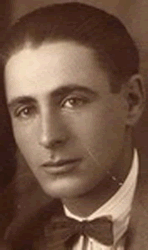
Moshe Sheratzky
Gender:
Male
Birth:
circa 1908
Poland
Death:
1975 (63-71)
Israel
→ Rachl Pasmanik
your relative?
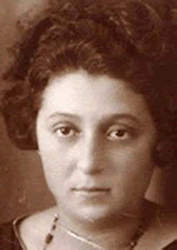
Rachel Pasmanik
Birth:
1905
Poland Lodz
Death:
July 1991
Israel
Immediate Family:
Daughter of Pinchas Pasmanik and Zlata Gala Wajnberg
Wife of Moshe Sheratzky
Mother of Yoshua Sheratzky and Gideon Sheratzky
You
→How are you related? → Pinchas Pasmanik
your relative?
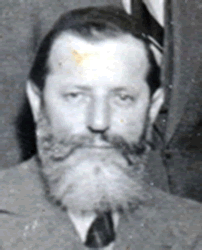
Pinchas Pasmanik (Pasamonik)
Gender:
Male
Birth:
1882
Poland Lodz
Death:
May 28, 1961 (79)
Tel Aviv-Yafo, Israel
Place of Burial:
Israel Kiryit Shol
Immediate Family:
Son of Akiwe Pasamanik
Husband of Zlata Gala Wajnberg
Father of Rachl Pasmanik; Bela Pasmanik; Akiva Pasmanik; Moshe Hiam Pasmanik; Chnna Pasmanik; <private> Lustgarten (Pasmanik) and Josf Pasmanik
|
| |
|
|
|











